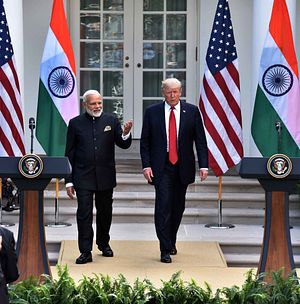Though democracy still flourishes around the globe, it is coming under renewed strain worldwide. Established democracies have been facing new populist and nationalist challenges, while others have slid rapidly backward into varying levels of autocracy. Governments of all stripes are attacking freedom of the press, reducing transparency and closing space for civic engagement and civil society.
The success of democracy in the future will require strong democratic models and champions to help others build and solidify democracy in their home countries. It also will require a concerted effort to rebuild trust between citizens and their governments. The United States and India – as the world’s two largest democracies – must build a strong partnership that can help bolster the prospects of democracy not only in each country, but around the world.
Amid the pressures and obstacles faced by each, the strength of democracy in the United States and India continues to persevere. The two countries are populous, diverse and composed of complicated federal systems.
But the two also face similar challenges to the strength of their democratic systems. Neither has been spared from attacks on free press and civil society, and both have faced challenges of government integrity, transparency and accountability. Moreover, both countries face new challenges linked especially to the role of technology in shaping democratic discourse. Technology, while deeply empowering, raises important questions including how to balance the use of big data to improve the delivery of services with privacy concerns, and how to balance the use of social media and the internet to spread unverified information with the need for a well-informed citizenry and free speech. Technology also presents ethics challenges that can cause citizens to doubt the integrity of the democratic system.
To better tackle these new challenges, the United States and India should work together by starting a conversation between both government and non-government players to develop creative approaches that improve trust in democratic institutions. By bringing together government officials, social media companies, educational institutions, open governance organizations, and others to share ideas and chart paths forward, we could develop innovative policy solutions in areas of internet governance, the effect of social media on democracy and the intersection of big data and privacy, among others.
These domestic challenges exist in a global environment where there is increasing skepticism by some concerning the form of liberal democracy practiced by the United States and India. The rise of right-wing populism in Europe and the United States (which includes and precipitated the election of Donald Trump) in the past few years has shocked many, and from the United States to Poland to Hungary, governments have attempted to undermine democratic institutions. Turkey’s democracy has regressed at the hands of President Recep Tayyip Erdogan, as has democracy in the Philippines under President Rodrigo Duterte. And in India too, there are concerns over the actions of far-right Hindu nationalists and measures to restrict space for civil society and a free press.
Combating what appears to some to be a wave of anti-democratic global populism requires countries to fight back by supporting emerging and transitioning democracies and working to reestablish democratic norms in their own nations. The partnership between the United States and India can play an important role in this effort, in particular through multilateral organizations like the Community of Democracies and the Open Government Partnership, both of which enable democracies to work together to strengthen democratic institutions.
In the Community of Democracies – of which the United States and India are both members – we recommend that the two countries lead an effort to share best practices for building democratic institutions, from a strong judiciary to a free press, with transitioning democracies that are seeking just this kind of assistance.
Likewise, the two countries should work together in the Open Government Partnership, which India should join. The OGP serves as a global platform for countries to improve government transparency, and India and the United States could share their unique experiences and challenges in building transparent executive branch agencies, creating national budgets and providing information on government activities to the public.
The key to the success of India and the United States – economic growth, military might, global leadership roles – has been built on a foundation of democratic institutions and principles, as well as a shared sense of responsibility to encourage democracies to flourish. With both countries – and the world – facing serious challenges to the strength of democracy, it is only natural that the world’s two largest democracies band together to help one another and others in continuing that never-ending journey to deepen democracy and ensure that it is present to deliver for people.
Yamini Aiyar is President and Chief Executive of the Centre for Policy Research, a public policy research organization based in India. Lisa Gilbert is Vice President for Legislative Affairs at Public Citizen, a U.S. organization promoting accountable and transparent governance. The authors are members of a Center for American Progress Task Force on U.S.-India Relations, from where this article is adapted.

































